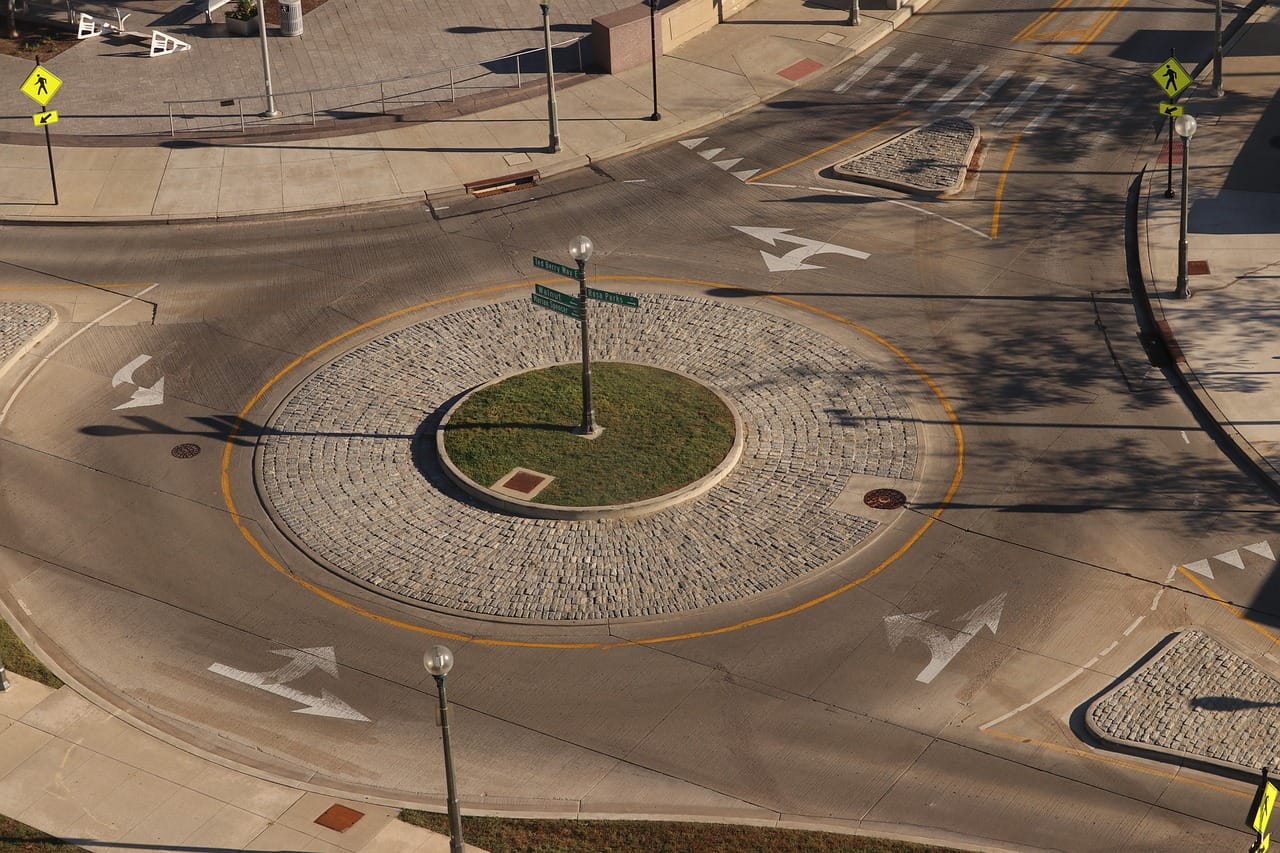Navigating roundabouts in the UK can sometimes be a tricky affair, and unfortunately, accidents do occur. When they do, understanding who’s at fault becomes a crucial aspect of resolving insurance claims and ensuring road safety. This comprehensive guide will delve into the intricacies of roundabout accidents in the UK, helping you understand the rules, common scenarios, and how to determine liability. We will also highlight how you can start a road traffic accident claim.
The Golden Rule: Give Priority to the Right
At the heart of roundabout navigation in the UK is the fundamental principle of giving priority to traffic already on the roundabout, particularly those approaching from your right. This means that before entering a roundabout, you must yield to any vehicles that are already circulating or are about to enter from your right.
Failing to observe this rule is a common cause of roundabout accidents and is likely to result in the driver entering the roundabout being deemed at fault. However, the situation can become more complex if the driver already on the roundabout was driving recklessly, such as speeding or changing lanes without signalling.
Common Roundabout Accident Scenarios and Fault
While the “priority to the right” rule serves as the basic guideline, there are various specific scenarios where determining fault can be less straightforward. Let’s explore some of these common scenarios:
Failing to Signal
Signalling is essential for clear communication on roundabouts. Failure to signal your intentions, whether entering, exiting, or changing lanes, can lead to confusion and accidents. The driver who failed to signal correctly will generally be held responsible.
Changing Lanes Incorrectly
Multi-lane roundabouts require extra care and attention. If a driver changes lanes without checking their blind spot or fails to signal, they can be held liable for any resulting collisions.
Cutting Across Lanes
Drivers who attempt to exit a roundabout from the wrong lane or cut across other lanes abruptly often cause accidents. Such actions disregard the proper lane usage outlined in the Highway Code and typically place fault on the driver making the risky manoeuvre.
Entering When Unsafe
Even if you have the right of way, entering a roundabout when it’s unsafe to do so can lead to an accident. If you enter a roundabout without adequately checking for oncoming traffic or misjudge the speed of other vehicles, you may be considered partially or wholly at fault.
Exiting Without Due Care
Exiting a roundabout also requires caution. You should signal your intention to exit in good time and ensure you have a safe gap in the traffic before leaving the roundabout. Failure to do so can result in an accident and potential liability.
The Role of Evidence in Determining Fault
In the aftermath of a roundabout accident, several factors contribute to establishing who is at fault.
A. Witness Statements
Witness accounts can provide crucial insights into the events leading up to the accident. Independent witnesses who observed the incident can help corroborate or contradict the versions of events provided by the involved drivers.
B. Dashcam Footage
Dash cams have become increasingly popular and can serve as invaluable evidence in roundabout accidents. Footage from dash cams can provide an objective record of the incident, helping to identify the responsible party.
C. Police Reports
If the police attend the scene of the accident, they will likely prepare a report detailing their observations and findings. While the police report itself may not assign blame, it can serve as crucial evidence for insurance companies and courts in determining fault.
The Importance of Seeking Legal Advice
Roundabout accidents can have significant consequences, both physically and financially. If you’ve been involved in such an accident, seeking legal advice from a qualified solicitor is highly recommended.
A solicitor can help you navigate the complexities of the legal process, gather evidence to support your claim, and negotiate with insurance companies to ensure you receive fair compensation for your injuries and losses.
Making a Road Traffic Accident Claim with National Claims
At National Claims, we understand the profound impact that road traffic accidents can have on your life and the lives of your loved ones. If you have been injured in an accident caused by another driver’s negligence, whether it be due to fatigue, distraction, or recklessness.
Free Consultation
We recognise that every road traffic accident case is unique, and we’re here to offer you a free, no-obligation consultation to discuss your specific situation. During this consultation, we’ll listen attentively to your experience, gather relevant details about the accident, and assess the potential strength of your claim.
Our team will then connect you with a qualified solicitor from our panel who specialises in road traffic accident claims, ensuring that you receive the expert legal representation needed to pursue your case effectively.
*Customers pay up to 25% (incl. VAT) of the amount recovered towards solicitor costs and if you cancel outside your cooling off period, you may be charged a fee.
Contact us today to speak to one of our claims agents who will be able to help you get started on your claim.
Click below to see why we are one of the most trusted claims management companies in the UK.

We’re proud of our excellent customer reviews
We thrive on delivering exceptional service and ensuring our clients’ satisfaction. Don’t just take our word for it. Check out some of our independent reviews to see what our clients have to say.
Excellent

This firm is excellent, they sorted out my car pay out and injury claim very fast, they always communicate with you all the time.

My accident case was dealt with confidence and with great result of the outcome, especially James kept me informed all the time.

I was very impressed at the way my inquiry was treated. I was listened to attentively and everything I needed to know was explained to me.






